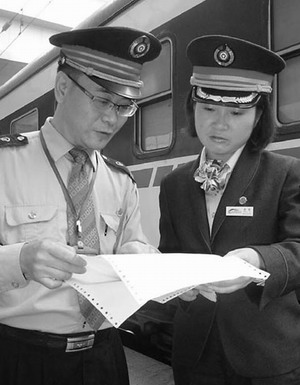|
 |
|
Zhou Li (right) and an official of the Beijing No 1 Team of the Chengdu Section of Passengers check how many train tickets have been sold before Train T8 leaves Chengdu on Sept 25. [Photo / China Daily]? |
Gou Jiayou feels sad that unlike his classmates he will not spend the coming holiday with his mother. "Mom never spends a holiday at home," says the 7-year-old, whose both parents work for the railway.
In fact, Zhou Li has never been home for the National Day since 1997, when she started working on the trains running between Chengdu in Sichuan province and Beijing. And she has spent only two Spring Festivals, the most important occasion for family reunion, with her family.
On the first three days of the seven-day National Day holiday this year, Zhou will travel from Chengdu to Beijing and back. Festivals are the busiest time for railway employees and it is common for them to be away from home, says the 36-year-old.
Train T7/8 that travels between Chengdu and Beijing usually carries about 1,800 passengers. But the number can exceed 2,000 during the National Day holiday as more tickets are sold to meet the demands of people going home or on tours, with many of them standing during the journey.
To prevent passengers from being injured during the holiday rush, Zhou and some 30 other crew members stand by the doors to help the old, weak, sick and physically challenged board the trains.
Zhou works in eight-hour shifts during the over 26-hour journey from Chengdu to Beijing. During each shift, she patrols all the 19 cars every two hours to ensure everything is normal.
A conductor since 2000, Zhou has twice seen women giving birth on a train during holidays. One night while patrolling a hard-sleeper car, Zhou heard a woman groaning and found that she had gone into labor. She looked for a doctor among the passengers and, after finding one, asked the passengers whose berths were near that of the mother-to-be to move out. Then she and four other crew members used quilt covers to block the entrance to the berths and prevent the strong wind from hurting the mother. Within 10 minutes, the woman gave birth to a boy.
"It was late at night and the passengers had to stay away from their berths for a moment. But they did not complain," Zhou says.
Pregnant women do not let railway staff know they could go into labor on the trip for fearing of being asked to get off the train and give birth in an unknown city. For similar reasons, terminally ill patients also conceal their conditions, she says.
A seriously ill old man from Sichuan was returning home after undergoing treatment in Beijing. When Zhou realized his condition was grave and he could die any moment, she requested his family members to get off the train with him at a station so that he could receive emergency treatment.
Upon their refusal, Zhou hired an oxygen cylinder for the man at the railway station in Guangyuan, a northernmost city in Sichuan, because the cylinder his relatives were carrying would have run out of oxygen about five hours before the train reached their destination.
Fortunately, the old man survived the trip. When he and his family members got off in Chengdu, they kept thanking Zhou. "They said the old man wished to die at home," Zhou says, "They understood my kindness although they were unhappy when I requested them to get off."
Despite the difficulties and tiredness in patrolling a train at night, Zhou is happy whenever she succeeds in eliminating a hidden danger or helps somebody, says Zeng Cuilan, 26, working with her for five years.
After working for three days at a stretch, Zhou gets three days off - the happiest days for her, as she can stay with her family, her son in particular.
Her husband Gou Xiaohua is a crew member on trains between Chengdu and Kunming, Yunnan province. When Zhou gave birth to their son, her husband was busy on a Chengdu-Shanghai train.
Since they are away from home most of the times, Zhou's father takes care of their son. Zhou feels sorry for not taking more care of her son, who has not visited Beijing, a city she visits frequently, although usually with tiredness.
For the many couples working for railways, it is common to make untold sacrifices, says Deng Hong, a senior official with Chengdu North Railway Station, from where Zhou's trains leave for Beijing and return.
During her off days, Zhou takes her son to school in the morning and brings him back in the afternoon every day. Sometimes over the weekends, they go to the cinema.
"My son likes visiting the Happy Valley Theme Park in the western suburb, so I bought an annual ticket to be able to go there whenever he wants," Zhou says tenderly, but they can visit the park only about four times a year.
"I try my best to keep him happy with whatever I can," she says, calmly.
|
|
|
|
|
|
|
|
